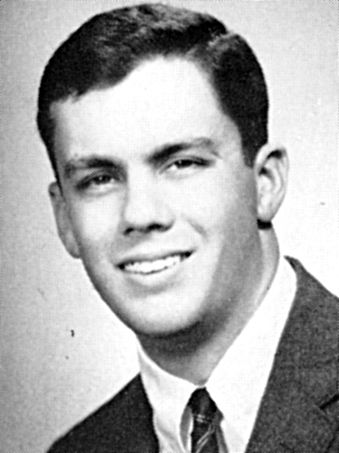
|
|
BILL BOND '62: AN EYE OPENER IN 1960 William B. Bond - 8/27/2020I grew up in the South, basically accepting society’s racial norms, until I was in high school. I worked as a laborer one summer, at a lumber company loading trucks under the supervision of a Black gentleman who taught me a lot about racial injustices. I had always been offended by the separate bathrooms and water fountains, but then went on about my business. One of my great-grandfathers was a Confederate senator, although he voted against secession, Another great-grandfather was a doctor in the army of Georgia. I remember telling his son, my grandfather, that I was glad the Union won the war, so that we had one America and did not have the institution of slavery. He agreed, even though he was born in 1873. My first experience going to school with a person of color was at Princeton. In August 1960 I was working as a credit trainee for a bank in downtown Jacksonville, Florida. After lunch one day, I walked by Woolworth's, where a group of young Black demonstrators were staging a sit-in and holding signs outside. A group of white toughs were taunting them. I intervened and told them to leave the protesters alone. They backed off momentarily, possibly thinking I had some clout that I did not actually have. When I got back to the office, I told the chairman of our bank what was going on, and he called the police. Nothing happened however, because as we have since learned, there were many Klansmen who wore police uniforms during the day. The violent attacks on the demonstrators at the Woolworths in Jacksonville a few days later came to be known as Ax Handle Saturday. I did not witness the attacks personally, but everyone in town knew what had happened, despite the fact our local newspaper, the Florida Times-Union, did as little coverage of it as they could. The establishment closed ranks pretty quickly, to minimize the impact on the segregated system, and to not scare away businesses from moving to Jacksonville.
My involvement at the time was very minimal, but it certainly sensitized me to the viciousness and meanness of those that were advocating segregation. My learning curve continued in the Marines. My platoon sergeant at Officer Candidate School was Black, and later, I served as Lieutenant of an integrated platoon. Around this time, I began supporting progressive candidates who supported racial equality. Much later, in 1986, as president-elect of the politically powerful Jacksonville Chamber of Commerce, my wife Sandy and I could find only one local event celebrating Martin Luther King‘s birthday, which had that year become a national holiday. It was an event sponsored by Morehouse College. Julian Bond was the speaker. Many businesses and the government of Jacksonville, both political and judicial, were not closing for the holiday. In fact, many were scorning it. We at the Chamber decided that we would try to eliminate the last vestiges of institutionalized segregation in the city. With the business community and the Chamber as the lead advocates, we got most businesses, the city government, and eventually the courthouse to close for Martin Luther King‘s birthday. We even had to get the Florida Supreme Court, by means of a civil rights march and other interventions, to remove a racist local chief judge. The Chamber also helped integrate the premier private business club. We very much tried to emulate Atlanta, which had said that it was a city that was “too busy to hate.“ While I was President of the Chamber of Commerce we teamed up with the NAACP, the Urban League, and the Mayor to start the largest ongoing civic event in Jacksonville, the Martin Luther King Breakfast, with often up to 2000 people in attendance. We did that to bring people together as well as to emphasize that it was indeed a holiday and was supposed to be honored as were other holidays on the public calendar. At that time many in the city were saying pejorative things about the holiday. In a 2007 speech at the Martin Luther King Breakfast, I recalled the South‘s progress in racial relations, noting the price many paid in blood and in scorn. Indeed our three-year-old son was threatened in 1987, by whom we presumed to be the Klan, after I had received the Jacksonville Urban League’s highest award, which in Jacksonville had never been given to a white person. In a cowardly way, they called my wife at 11 o’clock at night and said they were going to rip my son’s arms and legs off. We had to have police protection for a time, and for years our son’s picture could not appear in school publications for fear of harm. Two years later, a key partner in these endeavors, Willye Dennis, the head of the Jacksonville NAACP chapter, had a package bomb sent to her. It was thankfully defused, because she’d heard of other persons being blown up earlier that day in Alabama, Atlanta, and Savannah. In Dixie, you had better take threats seriously. Subsequently I joined the board of the National Urban League, and my wife, Sandy, served on the board of the Jacksonville Urban League. More recently, Sandy and I have worked on equal rights for the LGBTQ community. We fought with many others for five years to get equal rights incorporated into our city charter, and indeed had to fight again this year against the results of a lawsuit that tried to negate that 2017 ordinance. We won a City Council vote by a decisive 16 to 3 margin earlier this year.
Sandy and Bill Bond 2012
|
Quick Links MARK YOUR CALENDAR
SEE WHO CAME TO 62/62 IN 2024! 
|
|
Contact: webmaster@princeton62.org |
Copyright © 2004-2026, Princeton Class of 1962 |

 Welcome to
Welcome to

